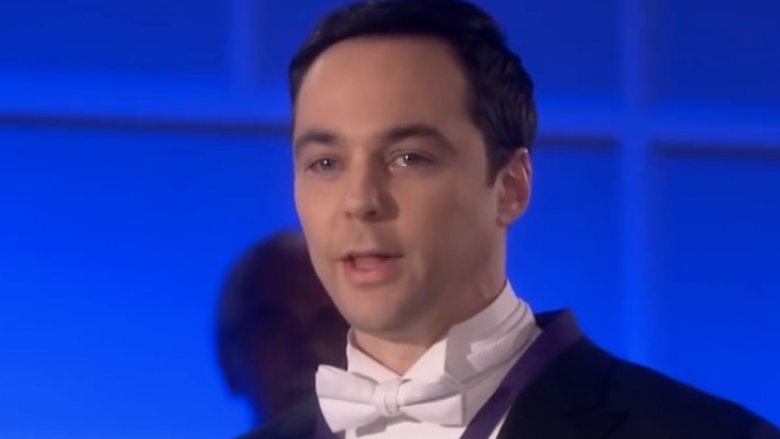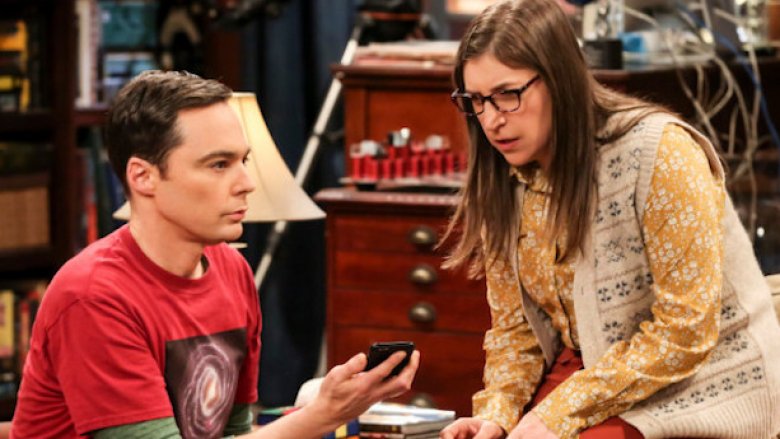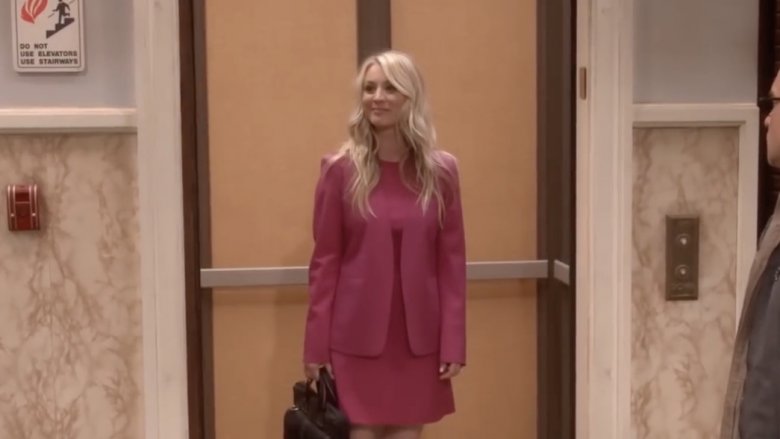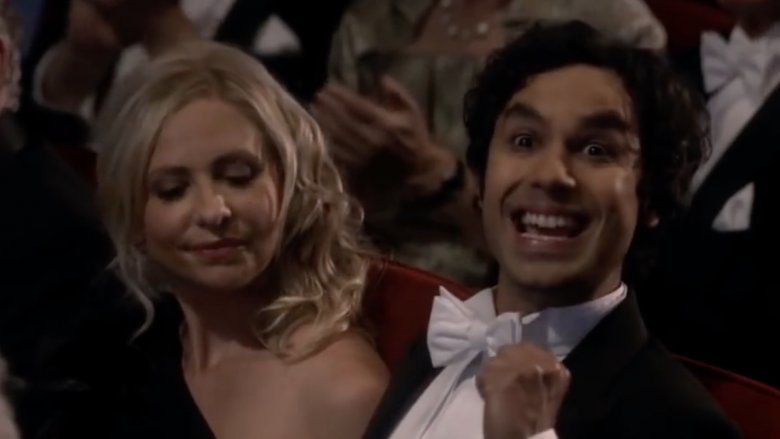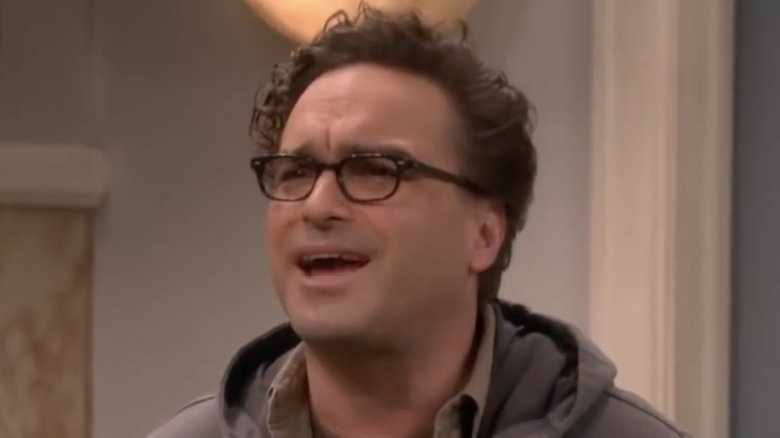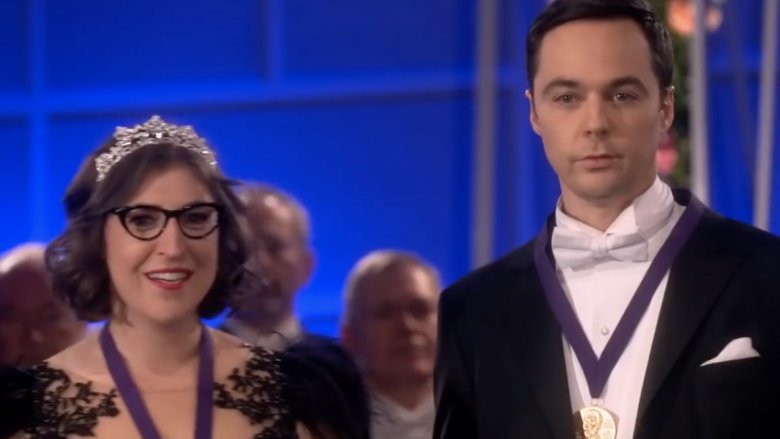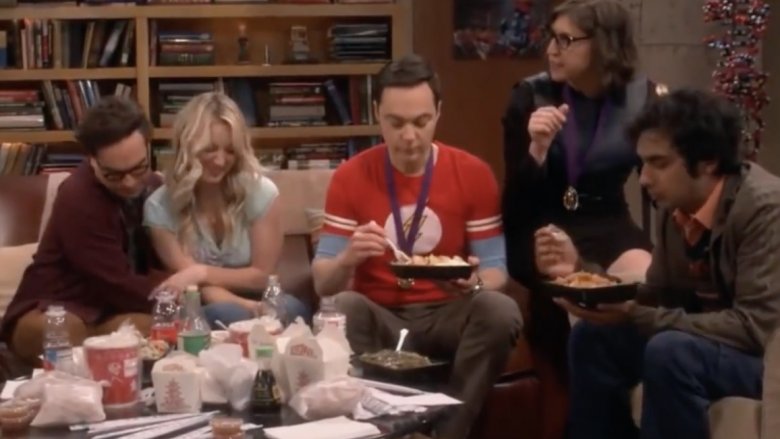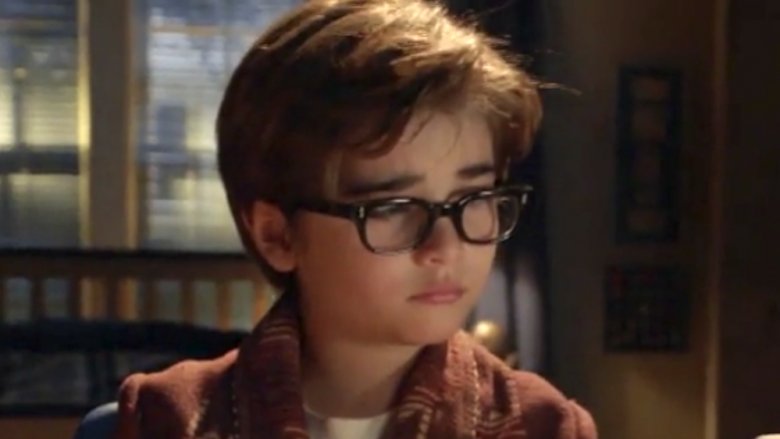The Ending Of Big Bang Theory Explained
After 12 years and 274 episodes — the most ever for a studio sitcom — The Big Bang Theory wrapped up its run on CBS on May 16, 2019. The double episode wrapped up as many outstanding storylines as possible while also sending its characters into a hopeful, fruitful future. A quick recap: Penny (Kaley Cuoco) and Leonard (Johnny Galecki) found out they were expecting a baby, despite deciding earlier in the season that they wouldn't have kids. Meanwhile, the biggest dreams and hard work for Amy (Mayim Bialik) and Sheldon (Jim Parsons) come true, as they win a Nobel Prize for Physics and fly off to Sweden to attend the fancy ceremony. The other characters come along, of course, even though Howard (Simon Helberg) and Bernadette (Melissa Rauch) experience more than a bit of anxiety leaving their kids for the first time.
The final installment was crammed full of references to past episodes and moments made to please fans, all combining for a sweet and satisfying finale. Here's a look at everything that went down, and why it all matters to the overall Big Bang Theory universe.
A Nobel premise
Long-running sitcom finales almost always involve a big event — characters move away, or a romantic "will they or won't they" thread ends happily, or some other big goal is achieved. For a show like The Big Bang Theory, about adults who have almost all married and become ensconced in their professions, that kind of big change wouldn't have rung true. Instead, the writers found an ending that made sense for its world-class scientist characters while also resolving a plot line that stretched throughout the show's 12th and final season.
Physicist Sheldon Cooper (Jim Parsons) and his wife, neuroscientist Amy Farrah Fowler (Mayim Bialik) win the Nobel Prize for Physics for their work on super-asymmetry. It's the ultimate goal of most any scientist (and one Sheldon specifically and frequently mentioned throughout the series), making it a great payoff for his character. It also gives the show an excuse for a destination finale, with the whole gang — Leonard, Penny, Bernadette, Howard, and Raj — accompanying Sheldon and Amy to the Nobel awards ceremony in Sweden.
Some loose ends were tied up...
Over the course of nearly 300 episodes, The Big Bang Theory developed quite a few running gags, recurring bits, and even unsolved mysteries. The finale gave fans what they wanted, delivering on those lengthy setups, answering unanswered questions, and wrapping things up nicely along the way.
Viewers finally learn why Leonard dresses the way he does. Forever sporting at least two layers on his upper body, despite living in sunny and warm Pasadena, California, he reveals that he's always rocking a hooded sweatshirt because he's always "chilly," as domineering Sheldon insists that the thermostat in the apartment be kept very low. And perhaps best of all, no more climbing all those stairs to those apartments — with a "ding," Penny emerges from the heretofore eternally out-of-order elevator.
A couple of the show's most prominent recurring characters get one scene a piece, doing exactly the things that made them indelible. John Ross Bowie reprises his role as string theorist Barry Kripke, Sheldon's workplace nemesis/bully, prank calling Sheldon as he waits to hear from the Nobel committee. Perpetually unlucky worrywart Stuart shows up too, video-chatting with Howard and Bernadette to let them know that one of their young children has knocked out a tooth in a weird accident.
...while others were not
But even a double-episode with nearly 45 minutes of running time wasn't enough to acknowledge or wrap up every storyline and plot point from the show's extensive past. When the series began in 2007, all four male main characters were single and socially awkward. By the end, three of them — Sheldon, Leonard, and Howard — have found love and gotten happily married. That leaves just Raj, the most romantic and lovelorn of them all. In one of the show's final episodes, it looks like he might move to London to live with his girlfriend, Anu (Rati Gupta), but after a talk with Howard, he realizes she isn't "the one," and that he ought to just wait it out.
The series ends with Raj just as single as when the show started. There may be hope for his love life, however. After spotting her on the flight over to Sweden, he does manage to convince Sarah Michelle Gellar — TV's Buffy the Vampire Slayer — to attend the Nobel ceremony with him.
And as for the answer to The Big Bang Theory's most enduring question, well, it didn't get an answer, and it probably never will. Before she became Mrs. Penny Hofstadter, her last name was never mentioned. Even when relatives visited, writers were careful to let the mystery be... and it will stay one.
The elephant in the room
While the final episode of The Big Bang Theory did have those big, finale worthy developments — Penny announcing her pregnancy chief among them — the "A" story of the installment was the gang's long-in-the-offing confrontation with Sheldon Cooper. A huge amount of the show's stories, jokes, and character quirks revolved around Sheldon being picky, fastidious, self-centered, arrogant, set in his ways, controlling, and unabashed about all of it. Most viewers have probably wondered why Amy, Sheldon, and the others can tolerate such an intolerable man.
Throughout the finale, most every character has finally had enough of Sheldon's callous selfishness... and they tell him off. Leonard screams at him when, after being told that Penny is pregnant, Sheldon's merely glad that she's got morning sickness and not a virus that he might catch. When Sheldon tells his wife, Amy, that he doesn't intend to be so mean, she drops the bomb that this obliviousness is the only reason why his entire group hasn't walked out on him.
Of course, this breakthrough serves to set up the finale's poignant peak.
Speech! Speech!
Sheldon's behavior is so terrible that Howard, Bernadette, Leonard, and Penny all make plans to head home early and skip the ceremony. But this is a bright and sunny network sitcom — that's not going to happen. Everyone's there when Amy and Sheldon accept science's highest honor. Both characters deliver speeches — one speaks to the show's legacy, and the other provides a happy, tearjerking moment.
The Big Bang Theory casually demystified science for millions, and probably inspired interest in more than a few kids. Reflecting actress Mayim Bialik's real-life background — she has a Ph.D. in neuroscience from UCLA — Amy gives a powerful, encouraging speech. "To all the young girls out there who dream about science as a profession: go for it," she says. "It is the greatest job in the world. And if anybody tells you you can't, don't listen."
Then it's Sheldon's turn. Stunned that his friends have stuck around to cheer him on after his actions, he eschews the novel-length, self-aggrandizing speech he'd prepared to do some things we've never seen him do: speak from the heart and thank others. "I was under a misapprehension that my accomplishments were mine alone," he says. "Nothing could be further from the truth. I have been encouraged, sustained, inspired, and tolerated not only by my wife, but by the greatest group of friends anyone ever had." Then he calls them out by name, asks them to stand, and they all get to share in the applause from the assembled luminaries.
How the ending ended
The Big Bang Theory could very well have ended in that auditorium in Sweden, with Sheldon and Amy on stage in front of their equally nattily dressed support system, the rest of the audience delivering a thunderous round of applause. But that was just the show's climax — it needed an epilogue. At its heart, as expressed explicitly through Sheldon's speech, The Big Bang Theory is a show about friendship, and how lovely it is when misfits grow up and create their own non-biological families. So much of the show consisted of the seven main characters hanging out in the main apartment set, gathering each evening to eat takeout. That was a fitting final image for the series: a group of people casually eating and chatting.
Underscoring that low-key moment: a new version of the show's Barenaked Ladies theme song. For the closing moments of the final episode, the band reworked the tune as a slow, almost maudlin acoustic number heard as the series faded into TV history.
It really wrapped up with Young Sheldon
The end of The Big Bang Theory served as the centerpiece of a night of thematic CBS programming. A few hours after the finale aired, all seven main cast members appeared for a group interview on The Late Show with Stephen Colbert, while the primetime lineup included the retrospective/clip show Unraveling the Mystery: A Big Bang Farewell. But between Big Bang and the look back at Big Bang fell the second-season finale of spinoff Young Sheldon.
Tying in to its parent show's Nobel Prize theme, the plot finds child Sheldon (Iain Armitage) throwing a party to hear the Nobel Prize winners announced on the radio. Nobody shows up, and, as Jim Parsons' narration says, it's the moment that Sheldon painfully realizes he's "destined to be alone forever." Then, in an extremely poignant montage, the Supremes' "Someday We'll Be Together" plays as viewers see what Sheldon's future loved ones are doing at that moment. Young Penny and young Bernadette sleep, young Raj studies, young Howard plays video games, young Amy reads a novel by candlelight, and young Leonard listens to the Nobel Prize event on the radio, too. As for being alone forever, narrator Sheldon adds, "Thankfully, I was wrong."
